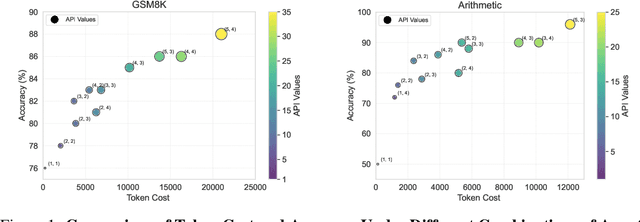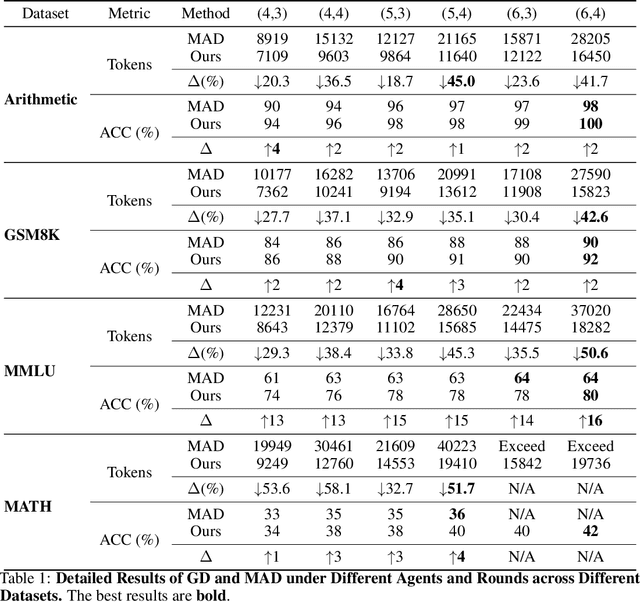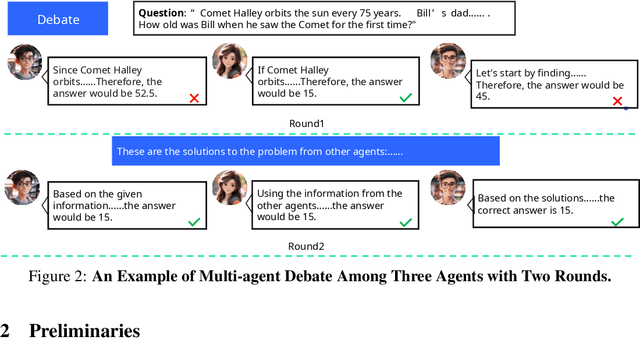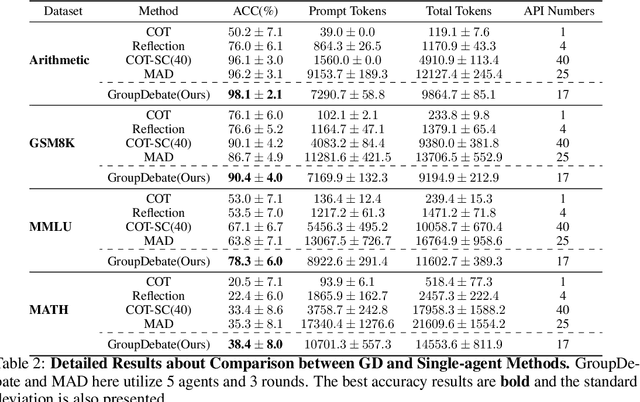Weizhe Huang
IFDNS: An Iterative Feedback-Driven Neuro-Symbolic Method for Faithful Logical Reasoning
Jan 12, 2026Abstract:Large language models (LLMs) have demonstrated impressive capabilities across a wide range of reasoning tasks, including logical and mathematical problem-solving. While prompt-based methods like Chain-of-Thought (CoT) can enhance LLM reasoning abilities to some extent, they often suffer from a lack of faithfulness, where the derived conclusions may not align with the generated reasoning chain. To address this issue, researchers have explored neuro-symbolic approaches to bolster LLM logical reasoning capabilities. However, existing neuro-symbolic methods still face challenges with information loss during the process. To overcome these limitations, we introduce Iterative Feedback-Driven Neuro-Symbolic (IFDNS), a novel prompt-based method that employs a multi-round feedback mechanism to address LLM limitations in handling complex logical relationships. IFDNS utilizes iterative feedback during the logic extraction phase to accurately extract causal relationship statements and translate them into propositional and logical implication expressions, effectively mitigating information loss issues. Furthermore, IFDNS is orthogonal to existing prompt methods, allowing for seamless integration with various prompting approaches. Empirical evaluations across six datasets demonstrate the effectiveness of IFDNS in significantly improving the performance of CoT and Chain-of-Thought with Self-Consistency (CoT-SC). Specifically, IFDNS achieves a +9.40% accuracy boost for CoT on the LogiQA dataset and a +11.70% improvement for CoT-SC on the PrOntoQA dataset.
TARAC: Mitigating Hallucination in LVLMs via Temporal Attention Real-time Accumulative Connection
Apr 05, 2025



Abstract:Large Vision-Language Models have demonstrated remarkable performance across various tasks; however, the challenge of hallucinations constrains their practical applications. The hallucination problem arises from multiple factors, including the inherent hallucinations in language models, the limitations of visual encoders in perception, and biases introduced by multimodal data. Extensive research has explored ways to mitigate hallucinations. For instance, OPERA prevents the model from overly focusing on "anchor tokens", thereby reducing hallucinations, whereas VCD mitigates hallucinations by employing a contrastive decoding approach. In this paper, we investigate the correlation between the decay of attention to image tokens and the occurrence of hallucinations. Based on this finding, we propose Temporal Attention Real-time Accumulative Connection (TARAC), a novel training-free method that dynamically accumulates and updates LVLMs' attention on image tokens during generation. By enhancing the model's attention to image tokens, TARAC mitigates hallucinations caused by the decay of attention on image tokens. We validate the effectiveness of TARAC across multiple models and datasets, demonstrating that our approach substantially mitigates hallucinations. In particular, TARAC reduces $C_S$ by 25.2 and $C_I$ by 8.7 compared to VCD on the CHAIR benchmark.
S$^2$-MAD: Breaking the Token Barrier to Enhance Multi-Agent Debate Efficiency
Feb 07, 2025



Abstract:Large language models (LLMs) have demonstrated remarkable capabilities across various natural language processing (NLP) scenarios, but they still face challenges when handling complex arithmetic and logical reasoning tasks. While Chain-Of-Thought (CoT) reasoning, self-consistency (SC) and self-correction strategies have attempted to guide models in sequential, multi-step reasoning, Multi-agent Debate (MAD) has emerged as a viable approach for enhancing the reasoning capabilities of LLMs. By increasing both the number of agents and the frequency of debates, the performance of LLMs improves significantly. However, this strategy results in a significant increase in token costs, presenting a barrier to scalability. To address this challenge, we introduce a novel sparsification strategy designed to reduce token costs within MAD. This approach minimizes ineffective exchanges of information and unproductive discussions among agents, thereby enhancing the overall efficiency of the debate process. We conduct comparative experiments on multiple datasets across various models, demonstrating that our approach significantly reduces the token costs in MAD to a considerable extent. Specifically, compared to MAD, our approach achieves an impressive reduction of up to 94.5\% in token costs while maintaining performance degradation below 2.0\%.
FoPru: Focal Pruning for Efficient Large Vision-Language Models
Nov 21, 2024



Abstract:Large Vision-Language Models (LVLMs) represent a significant advancement toward achieving superior multimodal capabilities by enabling powerful Large Language Models (LLMs) to understand visual input. Typically, LVLMs utilize visual encoders, such as CLIP, to transform images into visual tokens, which are then aligned with textual tokens through projection layers before being input into the LLM for inference. Although existing LVLMs have achieved significant success, their inference efficiency is still limited by the substantial number of visual tokens and the potential redundancy among them. To mitigate this issue, we propose Focal Pruning (FoPru), a training-free method that prunes visual tokens based on the attention-based token significance derived from the vision encoder. Specifically, we introduce two alternative pruning strategies: 1) the rank strategy, which leverages all token significance scores to retain more critical tokens in a global view; 2) the row strategy, which focuses on preserving continuous key information in images from a local perspective. Finally, the selected tokens are reordered to maintain their original positional relationships. Extensive experiments across various LVLMs and multimodal datasets demonstrate that our method can prune a large number of redundant tokens while maintaining high accuracy, leading to significant improvements in inference efficiency.
Leveraging LLMs for Hypothetical Deduction in Logical Inference: A Neuro-Symbolic Approach
Oct 29, 2024



Abstract:Large Language Models (LLMs) have exhibited remarkable potential across a wide array of reasoning tasks, including logical reasoning. Although massive efforts have been made to empower the logical reasoning ability of LLMs via external logical symbolic solvers, crucial challenges of the poor generalization ability to questions with different features and inevitable question information loss of symbolic solver-driven approaches remain unresolved. To mitigate these issues, we introduce LINA, a LLM-driven neuro-symbolic approach for faithful logical reasoning. By enabling an LLM to autonomously perform the transition from propositional logic extraction to sophisticated logical reasoning, LINA not only bolsters the resilience of the reasoning process but also eliminates the dependency on external solvers. Additionally, through its adoption of a hypothetical-deductive reasoning paradigm, LINA effectively circumvents the expansive search space challenge that plagues traditional forward reasoning methods. Empirical evaluations demonstrate that LINA substantially outperforms both established propositional logic frameworks and conventional prompting techniques across a spectrum of five logical reasoning tasks. Specifically, LINA achieves an improvement of 24.34% over LINC on the FOLIO dataset, while also surpassing prompting strategies like CoT and CoT-SC by up to 24.02%. Our code is available at https://github.com/wufeiwuwoshihua/nshy.
Logic-of-Thought: Injecting Logic into Contexts for Full Reasoning in Large Language Models
Sep 26, 2024



Abstract:Large Language Models (LLMs) have demonstrated remarkable capabilities across various tasks but their performance in complex logical reasoning tasks remains unsatisfactory. Although some prompting methods, such as Chain-of-Thought, can improve the reasoning ability of LLMs to some extent, they suffer from an unfaithful issue where derived conclusions may not align with the generated reasoning chain. To address this issue, some studies employ the approach of propositional logic to further enhance logical reasoning abilities of LLMs. However, the potential omissions in the extraction of logical expressions in these methods can cause information loss in the logical reasoning process, thereby generating incorrect results. To this end, we propose Logic-of-Thought (LoT) prompting which employs propositional logic to generate expanded logical information from input context, and utilizes the generated logical information as an additional augmentation to the input prompts, thereby enhancing the capability of logical reasoning. The LoT is orthogonal to existing prompting methods and can be seamlessly integrated with them. Extensive experiments demonstrate that LoT boosts the performance of various prompting methods with a striking margin across five logical reasoning tasks. In particular, the LoT enhances Chain-of-Thought's performance on the ReClor dataset by +4.35%; moreover, it improves Chain-of-Thought with Self-Consistency's performance on LogiQA by +5%; additionally, it boosts performance of Tree-of-Thoughts on ProofWriter dataset by +8%.
GroupDebate: Enhancing the Efficiency of Multi-Agent Debate Using Group Discussion
Sep 21, 2024



Abstract:In recent years, Large Language Models (LLMs) have demonstrated remarkable capabilities across diverse NLP tasks. Extensive research has explored how to enhance the logical reasoning abilities such as Chain-of-Thought, Chain-of-Thought with Self-Consistency, Tree-Of-Thoughts, and multi-agent debates. In the context of multi-agent debates, significant performance improvements can be achieved with an increasing number of agents and debate rounds. However, the escalation in the number of agents and debate rounds can drastically raise the tokens cost of debates, thereby limiting the scalability of the multi-agent debate technique. To better harness the advantages of multi-agent debates in logical reasoning tasks, this paper proposes a method to significantly reduce token cost in multi-agent debates. This approach involves dividing all agents into multiple debate groups, with agents engaging in debates within their respective groups and sharing interim debate results between groups. Comparative experiments across multiple datasets have demonstrated that this method can reduce the total tokens by up to 51.7% during debates and while potentially enhancing accuracy by as much as 25%. Our method significantly enhances the performance and efficiency of interactions in the multi-agent debate.
Survey of Computerized Adaptive Testing: A Machine Learning Perspective
Apr 05, 2024Abstract:Computerized Adaptive Testing (CAT) provides an efficient and tailored method for assessing the proficiency of examinees, by dynamically adjusting test questions based on their performance. Widely adopted across diverse fields like education, healthcare, sports, and sociology, CAT has revolutionized testing practices. While traditional methods rely on psychometrics and statistics, the increasing complexity of large-scale testing has spurred the integration of machine learning techniques. This paper aims to provide a machine learning-focused survey on CAT, presenting a fresh perspective on this adaptive testing method. By examining the test question selection algorithm at the heart of CAT's adaptivity, we shed light on its functionality. Furthermore, we delve into cognitive diagnosis models, question bank construction, and test control within CAT, exploring how machine learning can optimize these components. Through an analysis of current methods, strengths, limitations, and challenges, we strive to develop robust, fair, and efficient CAT systems. By bridging psychometric-driven CAT research with machine learning, this survey advocates for a more inclusive and interdisciplinary approach to the future of adaptive testing.
Efficiently Measuring the Cognitive Ability of LLMs: An Adaptive Testing Perspective
Jun 18, 2023Abstract:Large language models (LLMs), like ChatGPT, have shown some human-like cognitive abilities. For comparing these abilities of different models, several benchmarks (i.e. sets of standard test questions) from different fields (e.g., Literature, Biology and Psychology) are often adopted and the test results under traditional metrics such as accuracy, recall and F1, are reported. However, such way for evaluating LLMs can be inefficient and inaccurate from the cognitive science perspective. Inspired by Computerized Adaptive Testing (CAT) used in psychometrics, we propose an adaptive testing framework for LLM evaluation. Rather than using a standard test set and simply reporting accuracy, this approach dynamically adjusts the characteristics of the test questions, such as difficulty, based on the model's performance. This allows for a more accurate estimation of the model's abilities, using fewer questions. More importantly, it allows LLMs to be compared with humans easily, which is essential for NLP models that aim for human-level ability. Our diagnostic reports have found that ChatGPT often behaves like a ``careless student'', prone to slip and occasionally guessing the questions. We conduct a fine-grained diagnosis and rank the latest 6 instruction-tuned LLMs from three aspects of Subject Knowledge, Mathematical Reasoning, and Programming, where GPT4 can outperform other models significantly and reach the cognitive ability of middle-level students. Different tests for different models using efficient adaptive testing -- we believe this has the potential to become a new norm in evaluating large language models.
 Add to Chrome
Add to Chrome Add to Firefox
Add to Firefox Add to Edge
Add to Edge